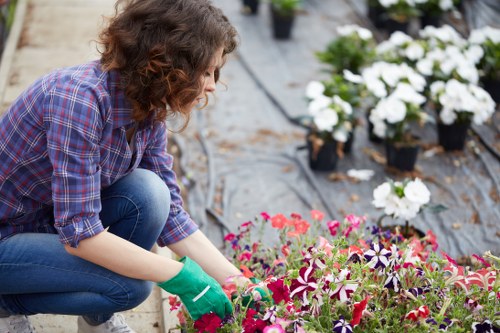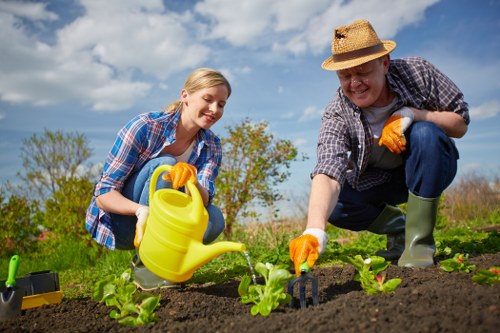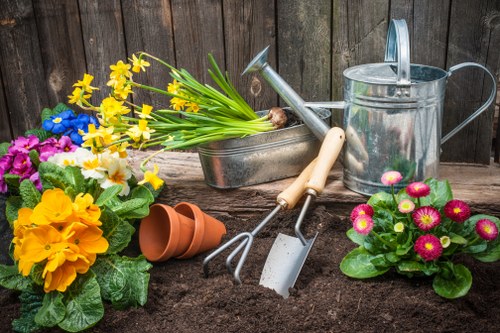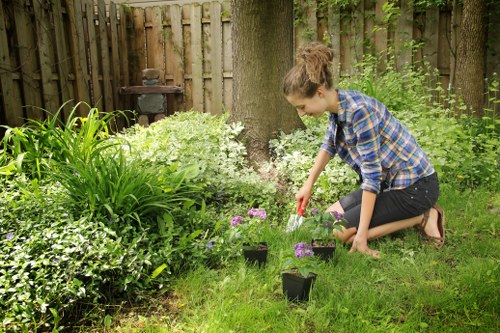Comprehensive Guide to Garden Maintenance in Bibra Lake
Understanding Garden Maintenance

Maintaining a beautiful garden in Bibra Lake requires a combination of knowledge, dedication, and the right tools. Whether you're a seasoned gardener or a beginner, understanding the essentials of garden upkeep can transform your outdoor space into a vibrant and thriving oasis.
Garden maintenance involves various tasks such as pruning, weeding, watering, and fertilizing. Each of these activities plays a crucial role in ensuring the health and longevity of your plants. Regular maintenance not only enhances the aesthetic appeal of your garden but also promotes a sustainable environment.
In Bibra Lake, the climate and soil conditions are unique, necessitating specific maintenance strategies. By tailoring your garden care practices to the local environment, you can achieve optimal growth and resilience in your plants.
Seasonal Garden Care

Spring Maintenance
Spring is a pivotal season for garden maintenance in Bibra Lake. As the weather warms up, it's time to prepare your garden for the growing season. Start by clearing away any debris from the winter months, including fallen leaves and dead branches.
Planting new flowers and vegetables should be done in early spring to give them ample time to establish before the peak growing season. Additionally, applying a balanced fertilizer can boost plant growth and promote healthy blooms.
Don't forget to check your irrigation system for any leaks or blockages. Proper watering is essential for the success of your garden, especially during the warmer months.
Summer Maintenance
Summer brings intense sunlight and higher temperatures, which can stress your plants. Regular watering is crucial during this period to prevent drought stress. It's best to water your garden early in the morning or late in the evening to reduce evaporation.
Mulching is another important aspect of summer maintenance. A layer of mulch helps retain soil moisture, suppress weeds, and regulate soil temperature. Choose organic mulches like wood chips or straw for added benefits such as soil enrichment.
Pest control becomes a priority in the summer months. Inspect your plants regularly for signs of pests and diseases, and take appropriate measures to manage them. Integrated Pest Management (IPM) strategies can help control pests while minimizing environmental impact.
Pruning and Trimming Techniques

The Importance of Pruning
Pruning is a fundamental aspect of garden maintenance that promotes plant health and enhances their appearance. Proper pruning techniques can encourage robust growth, improve air circulation, and prevent the spread of diseases.
Different plants require different pruning approaches. For instance, flowering shrubs may need to be pruned after blooming to encourage future blooms, while fruit trees benefit from annual pruning to maintain shape and productivity.
When pruning, always use sharp and clean tools to make precise cuts. Removing dead or diseased branches first ensures that the plant can focus its energy on healthy growth.
Trimming Hedges and Bushes
Maintaining well-shaped hedges and bushes adds structure and order to your garden. Regular trimming prevents overgrowth and keeps plants looking neat. It's advisable to trim hedges in the early spring and late summer to maintain their form.
Use hedge shears for smaller, precise cuts and loppers or pruning saws for larger branches. Always follow the natural shape of the plant to avoid stress and damage.
Consistency is key when trimming. Regular maintenance ensures that your hedges and bushes remain healthy and aesthetically pleasing throughout the year.
Soil Health and Fertilization

Testing and Amending Soil
Healthy soil is the foundation of a thriving garden. Conducting regular soil tests in Bibra Lake helps determine the pH levels and nutrient content of your soil. Based on the results, you can amend your soil to create optimal growing conditions.
Adding organic matter such as compost or well-rotted manure improves soil structure, enhances fertility, and promotes beneficial microbial activity. This, in turn, supports robust plant growth and resilience against pests.
For specific nutrient deficiencies, targeted fertilizers can be applied to address gaps. It's important to follow recommended application rates to avoid over-fertilization, which can harm plants and the surrounding environment.
Choosing the Right Fertilizers
Selecting the appropriate fertilizer is essential for meeting the nutritional needs of your plants. Balanced fertilizers with equal proportions of nitrogen, phosphorus, and potassium are suitable for most gardens.
Alternatively, you can use specialized fertilizers tailored to specific plant types, such as acid-loving plants or flowering species. Organic fertilizers offer a sustainable option, improving soil health over time without introducing harmful chemicals.
Regular feeding schedules ensure that your plants receive a consistent supply of nutrients, promoting continuous growth and vibrant blooms.
Weed Control Strategies

Preventative Measures
Weeds compete with your garden plants for nutrients, water, and sunlight, making effective weed control essential. Implementing preventative measures can significantly reduce weed growth in your garden.
Mulching is one of the most effective strategies for suppressing weeds. A thick layer of mulch blocks sunlight, preventing weed seeds from germinating. Additionally, maintaining healthy, dense plant growth naturally crowds out weeds.
Regularly inspecting your garden and removing weeds by hand or with appropriate tools helps keep their population in check. Prompt removal prevents weeds from setting seeds and spreading further.
Organic and Chemical Weed Control
For those seeking eco-friendly solutions, organic weed control methods are preferable. Natural herbicides made from vinegar or other plant-based substances can effectively manage weed growth without harming beneficial plants.
Mechanical methods such as hoeing, tilling, and using weed barriers can also control weeds without chemical intervention. These methods are labor-intensive but environmentally safe.
In cases of severe infestations, chemical herbicides may be necessary. It's important to use them judiciously, following label instructions to minimize environmental impact and protect non-target plants.
Irrigation and Water Management
Efficient Watering Practices
Proper irrigation is vital for garden maintenance in Bibra Lake. Efficient watering practices ensure that plants receive the right amount of moisture without wasting water resources.
Drip irrigation systems are highly effective, delivering water directly to the plant roots where it's needed most. This method reduces evaporation and minimizes water runoff, promoting efficient water use.
Timing your watering sessions is equally important. Early morning or late evening watering reduces water loss and allows plants to absorb moisture more effectively.
Rainwater Harvesting
Implementing rainwater harvesting systems can enhance water management in your garden. Collecting and storing rainwater provides a sustainable water source for your plants, especially during dry spells.
Rain barrels or other storage containers can capture runoff from your roof, filtering out debris before storing the water for later use. This not only conserves water but also reduces your dependency on municipal water supplies.
Incorporating rain gardens, which are designed to absorb and filter rainwater, can improve drainage and reduce the risk of waterlogging in your garden areas.
Pest and Disease Management
Identifying Common Pests
Managing pests is a critical component of garden maintenance. Common garden pests in Bibra Lake include aphids, caterpillars, and beetles, which can cause significant damage to your plants.
Regular monitoring of your garden helps in early detection of pest issues. Identifying pests promptly allows for timely intervention, preventing extensive damage.
Natural predators such as ladybugs and lacewings can help control pest populations organically. Encouraging these beneficial insects by providing suitable habitats enhances your pest management efforts.
Preventing Plant Diseases
Plant diseases like powdery mildew, root rot, and blight can compromise the health of your garden. Preventative measures are essential to minimize the risk of disease outbreaks.
Proper spacing of plants improves air circulation, reducing the likelihood of fungal infections. Additionally, practicing crop rotation and using disease-resistant plant varieties can enhance your garden's resilience against diseases.
Sanitation is also key. Remove and dispose of any diseased plant material promptly to prevent the spread of pathogens.
Choosing the Right Plants for Bibra Lake
Climate-Appropriate Species
Selecting plants that are well-suited to the Bibra Lake climate ensures their successful growth and reduces maintenance efforts. Native plants are often the best choice as they are adapted to the local environment and require less water and care.
Consider drought-tolerant species to withstand periods of low rainfall. Plants like lavender, rosemary, and succulents thrive in arid conditions and add aesthetic value to your garden.
Incorporating a mix of perennials and annuals creates a dynamic and resilient garden. Perennials provide long-term structure, while annuals offer seasonal color and variety.
Enhancing Biodiversity
A diverse garden supports a healthy ecosystem by attracting pollinators and beneficial insects. Incorporate a variety of flowering plants, shrubs, and trees to create habitats for wildlife.
Herb gardens not only add flavor to your culinary endeavors but also attract pollinators like bees and butterflies. Additionally, incorporating edible plants contributes to sustainable living practices.
Strategic plant placement and layering create visual interest and promote ecological balance within your garden space.
Tools and Equipment for Garden Maintenance
Essential Gardening Tools
Having the right tools is essential for efficient garden maintenance. Invest in quality tools that are durable and ergonomic to make gardening tasks easier and more enjoyable.
Key tools include a sturdy shovel, versatile pruners, a reliable hose or watering system, and a comfortable pair of gloves. Additionally, tools like rakes, hoes, and trowels are indispensable for various maintenance activities.
Regularly maintaining your tools by cleaning and sharpening ensures their longevity and effectiveness in the garden.
Advanced Equipment
For larger gardens, specialized equipment can streamline maintenance tasks. Mulchers, lawnmowers, and hedge trimmers can save time and effort, allowing for more comprehensive garden care.
Automated irrigation systems and drip emitters enhance water management, providing consistent hydration without manual intervention. These advancements contribute to a more sustainable and efficient garden maintenance routine.
Investing in advanced tools may require an initial investment, but they pay off by reducing labor and improving the overall health of your garden.
Local Expertise and Professional Services
Benefits of Hiring Professionals
While DIY garden maintenance can be rewarding, enlisting professional gardening services in Bibra Lake offers numerous advantages. Professional gardeners possess the expertise and experience to handle complex maintenance tasks effectively.
Hiring professionals ensures that your garden receives comprehensive care, from soil analysis to pest management. Their knowledge of local plant species and climate conditions allows them to tailor maintenance strategies for optimal results.
Professional services also save you time and effort, allowing you to enjoy a beautiful garden without the physical strain of maintaining it yourself.
Choosing the Right Service Provider
Selecting a reputable garden maintenance company in Bibra Lake involves considering factors such as experience, services offered, and customer reviews. Look for providers who offer customized maintenance plans to meet your garden's specific needs.
Ensure that the professionals you hire use environmentally friendly practices and safe products to protect your plants and the surrounding ecosystem.
Transparent pricing and clear communication are key indicators of a reliable service provider. Don't hesitate to ask for references or examples of their previous work to gauge their expertise.
10-15 Nearby Areas to Bibra Lake for Garden Maintenance Services
- Bibra Heights: Located just north of Bibra Lake, Bibra Heights offers lush green spaces and a variety of garden styles.
- Floreat Park: Known for its vibrant community gardens and extensive plant variety.
- Embleton: A neighboring suburb with a strong focus on sustainable gardening practices.
- Palmyra: Offers picturesque garden landscapes and professional maintenance services.
- Wellard: Known for its spacious properties and dedicated garden enthusiasts.
- Ferndale: Home to several botanical gardens and expert horticulturists.
- Crawley: A short drive from Bibra Lake, Crawley boasts numerous public and private gardens.
- Wakefield: Features a mix of urban and suburban gardens with diverse plant species.
- East Bisdad: Offers specialized garden maintenance services tailored to residential needs.
- Connolly: Known for its community-driven gardening initiatives and workshops.
- Menora: A thriving area with access to top-notch gardening resources and experts.
- Spearwood: Provides excellent garden maintenance services with a focus on eco-friendly practices.
- Jandakot: Offers a variety of gardening services, including landscape design and maintenance.
- Mount Pleasant: Known for its beautiful private gardens and professional upkeep services.
- Curtin University: Features extensive campus gardens and maintenance facilities available to the public.
Conclusion and Next Steps
Maintaining a Beautiful Garden
Effective garden maintenance in Bibra Lake is a blend of knowledge, regular care, and the right resources. By understanding the specific needs of your garden and implementing best practices, you can enjoy a thriving and beautiful outdoor space all year round.
Whether you choose to maintain your garden yourself or hire professional services, the key is consistency and attention to detail. Regular inspections, timely interventions, and sustainable practices ensure that your garden remains a source of joy and relaxation.
Take Action Today
Ready to transform your garden into a lush paradise? Contact us today to schedule your garden maintenance service in Bibra Lake. Our team of experts is dedicated to providing top-notch care tailored to your garden's unique needs.
Don't wait! Book your service now and take the first step towards a beautiful and well-maintained garden.
